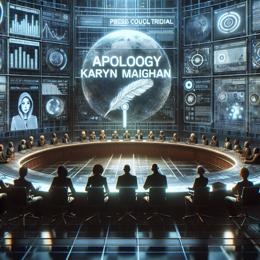Image created by AI
Landmark Press Council Case Puts Independent Media and Opinion Writing on Trial
In a landmark case for South Africa's press, Independent Media is under the microscope again, facing a Press Council hearing over a contentious opinion piece targeting News24 journalist Karyn Maughan. This case, brought forth by Maughan's legal team, will rigorously examine the boundaries of commentary in journalism, distinguishing between robust critique and damaging insults within published media.
The article in question features severe accusations labeling Maughan as an apartheid-style agent and comparing her to a Nazi propagandist – allegations Maughan contests as unfounded and defamatory. Such strong claims underscore the debate at hand: at what point does the journalistic latitude for commentary infringe upon an individual's dignity and reputation, contravening the ethical standards enshrined within the South African Press Code?
Independent Media’s recent editorial challenges accentuate this tipping point. The company’s past includes unverified assertions against the Daily Maverick and an erroneous identification during a campaign to unmask an anonymous critic, leading to a significant lawsuit. These incidents compound the importance of the current Press Council hearing, which not only reflects on one article but also implicates the broader ethos of media accountability and the fair exercise of freedom of expression.
Both testimony and the Press Code itself acknowledge the right to publish commentary that is extreme or exaggerated, provided it's in the public interest, devoid of malice, and built on a reasonable interpretation of facts. However, the contention arises when such pieces are perceived to embody a harmful intent or unfounded assertions, begging the question of whether the Press Code's allowance for critique is vulnerable to exploitation.
Even more compelling is the enigma surrounding the authorship of the disputed article. Edmond Phiri, presented as the author, seems untraceable, heightening suspicions of a pseudonym employed to obfuscate the true source of the contentious opinions. This lack of transparency threatens to undermine the delicate trust between a news outlet and its audience, and may potentially reinforce assumptions of malicious intent.
For opinion writers and journalists across South Africa, the case's outcome will set a precedent, drawing the hypothetical line in the sand between permissible critique and prohibited defamation. It is a moment that will shape the landscape of news commentary, balancing the cherished ideals of free expression with the necessity for editorial truthfulness and integrity.
The Press Council must now navigate this complex scenario, weighing the principles of a free press against the obligation to protect individuals from slanderous harm. As in all matters of freedom of expression, the boundaries are rarely clear-cut, but this case promises to offer, at the least, a heightened sense of direction in this critical area of journalism.










